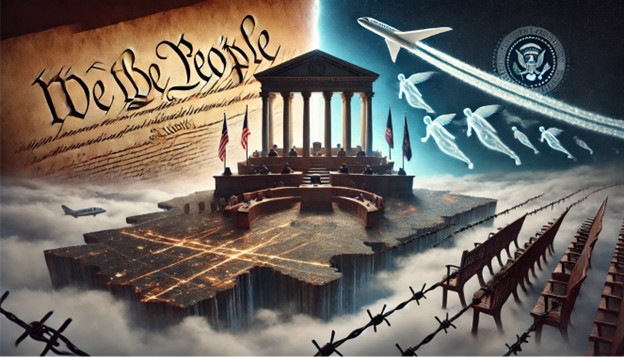Deportation by Decree: Trump's New Power Over Immigration
Input
Modified
A Supreme Showdown Over War Powers and Immigration Judicial Dissent and the Ghosts of Korematsu Resurrecting a Dormant Power—and Redefining Presidential Authority

A Supreme Showdown Over War Powers and Immigration
On a quiet April morning in 2025, three U.S. government-chartered planes landed in El Salvador, carrying over a hundred Venezuelan men who had been swiftly deported from the United States. The men, many confused, some visibly distressed, were ushered into the gates of the Center for Terrorism Confinement (CECOT)—a maximum-security prison internationally criticized for its harsh conditions. Their removal wasn’t the result of lengthy court trials or due process, but the outcome of a rarely used 18th-century law: the Alien Enemies Act of 1798.
President Donald Trump, in his renewed bid to reshape immigration enforcement during his second term, had turned to this centuries-old statute. Originally crafted during fears of war with France, the Act allows the president to detain or deport foreign nationals from enemy countries during times of war or invasion. For most of modern American history, it remained dormant—used only a handful of times during officially declared wars, most notably World War II. Until now.
Trump’s administration invoked the Alien Enemies Act not to remove enemy soldiers or agents of a foreign state, but to deport undocumented Venezuelans allegedly affiliated with the criminal syndicate Tren de Aragua. The gang, originating in Venezuelan prisons, has been blamed for violent crimes across Latin America and, more recently, for expanding its presence into U.S. cities. Labeling the organization a foreign terrorist group, Trump framed its members as conducting “irregular warfare” against the United States—effectively casting gang violence as an act of invasion.
By leaning on the Alien Enemies Act, the administration bypassed traditional immigration courts and due process protections. The result was a fast-moving deportation campaign that swept up at least 137 individuals, according to official records. And as these deportations were carried out, a legal firestorm began.
Alarmed by the administration’s strategy, the American Civil Liberties Union (ACLU) filed suit on behalf of five detained Venezuelan migrants. The case was brought before U.S. District Judge James Boasberg, who issued a temporary injunction halting the deportations, ruling that the use of the Alien Enemies Act in this context demanded judicial scrutiny.
Boasberg wasn’t convinced that Trump’s framing of the situation met the constitutional bar for war powers. Moreover, he chastised the government’s response to the court’s inquiry as “woefully insufficient.” Though two of the deportation flights had already departed, the court's intervention stopped further removals—at least temporarily.
The Trump administration quickly appealed. The D.C. Circuit Court of Appeals upheld Boasberg’s injunction, agreeing that there were unanswered constitutional questions about applying a wartime statute in the absence of a formal war declaration, which only Congress can authorize. But that victory for civil liberties was short-lived.
The administration made an emergency appeal to the U.S. Supreme Court, framing the issue as one of executive authority in foreign policy and national security. Trump’s team argued that Judge Boasberg had no jurisdiction over the case and that decisions about deporting foreign nationals accused of threatening public safety should rest with the presidency, not the courts.
On April 7, 2025, the Supreme Court issued a 5–4 unsigned opinion allowing the deportations to resume—with conditions. The Court vacated Boasberg’s injunction and sided procedurally with the Trump administration. It ruled that the ACLU’s challenge had been filed in the wrong jurisdiction—Washington, D.C.—and must instead be pursued in Texas, where the migrants were detained.
However, the Court didn’t give the administration a blank check. It specified that individuals subject to removal under the Alien Enemies Act must receive adequate notice and be given “reasonable time” to file habeas corpus petitions—the traditional legal method of challenging unlawful detention—in the correct venue. It effectively ruled that deportation under the statute could proceed, but not without the procedural protections afforded by due process.
Even this limited safeguard was enough for both the ACLU and the administration to claim partial victory. “The critical point,” said Lee Gelernt, the ACLU’s lead attorney, “is that the Supreme Court said individuals must be given due process to challenge their removal under the Alien Enemies Act.”
But with the Court’s conditions, a new challenge arose: how detainees—many non-English-speaking and without legal representation—could realistically file petitions from inside detention centers in Texas, governed by the conservative Fifth Circuit Court of Appeals, known for its deference to executive power.

Judicial Dissent and the Ghosts of Korematsu
Not all justices agreed with the majority. Justice Sonia Sotomayor, joined by Justices Elena Kagan, Ketanji Brown Jackson, and even conservative Justice Amy Coney Barrett, issued a blistering dissent. They condemned the administration’s rush to deport individuals before courts could assess the legality of the removals. Sotomayor wrote that the government’s behavior in the case “poses an extraordinary threat to the rule of law.”
Justice Barrett, though not penning her own opinion, joined the portion of Sotomayor’s dissent questioning whether habeas corpus petitions should be the sole legal avenue available to challenge deportations under the Act.
In a related dissent, Justice Jackson criticized the Court’s reliance on the “emergency docket”—often dubbed the “shadow docket”—to make such consequential decisions without oral arguments or full briefings. She invoked the shameful precedent of Korematsu v. United States, the 1944 case where the Supreme Court upheld Japanese-American internment during World War II. “At least when the Court went off base in the past,” she wrote, “it left a record so posterity could see how it went wrong.”
The parallels were striking. Both cases involved the use of wartime powers to justify extraordinary actions against non-citizens. Both raised concerns about procedural fairness and executive overreach. And both sparked outrage from legal scholars who saw the Court abdicating its duty to check the presidency.
Despite the dissent, the administration celebrated the ruling as a triumph. Trump posted jubilantly on Truth Social, calling it “a great day for justice in America.” He declared that the Court had affirmed the right of any president to “secure our borders and protect our families and our Country.”
Meanwhile, families of the deported were left to pick up the pieces. Some claimed their relatives were wrongly identified as gang members due to tattoos or community rumors. Others were simply undocumented migrants with no history of criminal activity. A few had lived in the U.S. for years. One deportee, Kilmar Armando Abrego Garcia, was removed to El Salvador by mistake due to an administrative error—an incident that underscored the risks of fast-track deportations under the guise of national security.

Resurrecting a Dormant Power—and Redefining Presidential Authority
The case of Trump v. J.G.G. and the resurrection of the Alien Enemies Act reveals more than a dispute over immigration policy—it showcases a dramatic expansion of presidential wartime powers in peacetime.
Historically, the Act was used to target citizens of countries with which the U.S. was at war—Germany, Italy, Japan—and only after Congress had declared war. In this instance, there has been no declaration of war against Venezuela, nor against any state actor. Instead, the administration reinterpreted “invasion” to include transnational gang activity, a claim legal experts say stretches the statute’s meaning beyond recognition.
Critics warn that this reinterpretation opens a dangerous precedent. If the executive branch can use wartime authority to remove individuals based on alleged gang affiliation—without a war, trial, or due process—it might pave the way for broader applications against other groups labeled national threats.
Civil rights groups are preparing for prolonged legal battles in the Fifth Circuit. Deportees and their families are organizing to publicize their cases. And legal scholars are urging Congress to review the scope and limits of the Alien Enemies Act, arguing that laws from the 18th century should not override 21st-century constitutional protections.
The Supreme Court ruling may be temporary, and the litigation is far from over. But for those already deported, due process is now a postscript, not a protection.
Whether the courts or Congress act to clarify or limit this authority in the future remains uncertain. What is clear is that the Trump administration has redefined how a wartime law can be used against civilians—not on a battlefield, but in immigration detention centers, courtroom appeals, and midnight deportation flights.





















